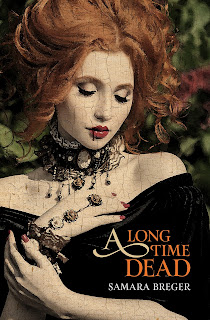Exiled to China for twenty years, Lucien Vaudrey never planned to return to England. But with the mysterious deaths of his father and brother, it seems the new Lord Crane has inherited an earldom. He’s also inherited his family’s enemies. He needs magical assistance, fast. He doesn't expect it to turn up angry. Magician Stephen Day has good reason to hate Crane’s family. Unfortunately, it’s his job to deal with supernatural threats. Besides, the earl is unlike any aristocrat he’s ever met, with the tattoos, the attitude... and the way Crane seems determined to get him into bed. That’s definitely unusual.
Soon Stephen is falling hard for the worst possible man, at the worst possible time. But Crane’s dangerous appeal isn't the only thing rendering Stephen powerless. Evil pervades the house, a web of plots is closing round Crane, and if Stephen can’t find a way through it—they’re both going to die.
"There's no good doing the right thing unless you stop people doing the wrong thing". K.J. Charles' The Magpie Lord is a fun victorian gothic fantasy novel that's brimming with heart, featuring a trip to the countryside to deal with a case of magical attacks that seems to have no explanation. The book starts heavily, with an attempted suicide, but this is quickly explained to be caused by a curse and then dealt with efficiently. Touching upon heavy themes of classism and consent, and featuring some body horror and mentions of incest, the novel lightens these subjects up with stellar dialogue and a strong romantic attraction between our two leads.
The magic system is intriguing, featuring also a bureaucractic aspect that I guess will be better explored in the other two books of the trilogy. We have magical ancestors, blood magic, creepy apparitions, sex magic, tingly touch-magic; many elements that contribute to make this a deliciously eerie book. It reminded me, at times, of Jonathan Strange and Mr Norrell, but there's no Faerie here. When the eponimous Magpie Lord and all things connected are revealed, things get very interesting.
The main characters are fantastic; one a lord banished from his home due to his proclivities, the other a magic practicioner with a justified grudge, they clash beautifully. Their relationship grows organically, but despite the steamy scenes between them I wouldn't classify this as a romance, nor a romantasy. The main issue is the magical mystery and the many abuses from people in power. Lucien's past in China is teased relentlessy, with constant comments and little references that whet the appetite. Stephen's backstory seems to still keep some things hidden, but what we have is enough to get a measure of him as a just man. Lucien's manservant is another well-rounded character I hope will have more focus on the next books. The villains is where this book falls a bit short, since they're unveiled at the end, to be people we've never seen. A good mystery should show us the culprit, try to make us guess.
The novel features period-typical homophopia, countered by the freedom Lucien enjoyed in China. This makes for an interesting dynamic with Stephen, although the constant mentions of their size difference and respective heights was a bit grating, veering somewhat into seme-uke territory; but the book makes up for it with constant and thorough discussions about consent and agency.
The Magpie Lord is a steamy magical mystery with great promise.
✨ 4 stars
📚📚📚 IF YOU LOVE THIS, YOU MIGHT LIKE:
* Witchmark, by C.L. Polk
for: magical romance, political struggles















